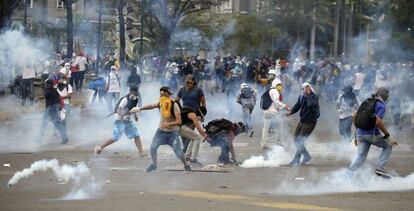Media in Venezuela under attack for coverage of unrest
'TalCual' publisher faces stiff jail term in defamation suit filed by National Assembly speaker

With the anti-government protests entering their second month in Venezuela, the media have come under severe attack by the Maduro administration and its supporters as they try to cover the volatile events unfolding in the South American nation.
Venezuela’s largest press union SNTP reported on Monday that at least 89 journalists have either been assaulted, arrested, or robbed while trying to cover the events and demonstrations that began in early February.
Law enforcement officers, paramilitaries supporting the government and others who have come out against the opposition are now using journalists as their prime targets, say SNTP officials.
On Monday, a team from La Nueva Prensa of Barcelona, the capital of Anzoátegui state, was robbed while the newspaper’s reporters were trying to cover unrest at the Universidad Santa María. In Valencia, capital of Carabobo state, reporters from El Carabobeño newspaper said soldiers from the National Guard threatened them while a journalist from El Universal, one of the leading dailies in Caracas, was subpoenaed to testify about a violent demonstration that took place in the Los Ruices neighborhood in which two people were killed.
The reporter, Deivis Ramírez, has been writing about the deaths that occurred last Wednesday, but her interpretations have differed from the government’s own version of the events that took place. According to officials, a National Guardsman and a motorcyclist were both shot dead by snipers perched on rooftops.
At least 89 journalists have been been assaulted, arrested, or robbed
The government of President Nicolás Maduro has now been using the judicial system to intimidate journalists, according to different press associations.
Diosdado Cabello, the powerful speaker of the National Assembly who is seen as the number two-ranking official in the country, filed a lawsuit recently against the liberal daily TalCual of Caracas for defamation after one of the newspaper’s columnists quoted him as brushing off concerns about the country’s crime rate.
The columnist, Carlos Genatios, said Cabello stated that those who complained about high crime should leave the country. The speaker allegedly made the remark following the death in early January of a former beauty queen-turned actress and her husband who were both ambushed by gunmen on a road while they waited to have their flat tire fixed. Cabello has denied ever making that statement.
If found guilty, the publisher and columnist face up to four years in prison and multi-million dollar fines. A judge has already restricted their movements, including preventing them from leaving the country.
Founded in 2000 by former guerilla Teodoro Petkoff, TalCual is a tabloid that has often been critical of late President Hugo Chávez and his successor Maduro.
Petkoff was one of the founders of the Movement toward Socialism (MAS) party in 1971 and served as economy minister under the last government of Rafael Caldera (1994-1999). He also backed opposition candidate Manuel Rosales, who unsuccessfully ran against Chávez in 2006.
Besides Petkoff and Genatios, Cabello has also named three of the newspaper’s board members – Francisco Layrisse, Manuel Puyana and Juan Antonio Golía – as defendants in his lawsuit.
In 2007, TalCual was ordered to pay a $200,000 fine after a court deemed an open letter to Chávez’s daughter Rosinés published as part of a humorous column to be offensive.
Tu suscripción se está usando en otro dispositivo
¿Quieres añadir otro usuario a tu suscripción?
Si continúas leyendo en este dispositivo, no se podrá leer en el otro.
FlechaTu suscripción se está usando en otro dispositivo y solo puedes acceder a EL PAÍS desde un dispositivo a la vez.
Si quieres compartir tu cuenta, cambia tu suscripción a la modalidad Premium, así podrás añadir otro usuario. Cada uno accederá con su propia cuenta de email, lo que os permitirá personalizar vuestra experiencia en EL PAÍS.
En el caso de no saber quién está usando tu cuenta, te recomendamos cambiar tu contraseña aquí.
Si decides continuar compartiendo tu cuenta, este mensaje se mostrará en tu dispositivo y en el de la otra persona que está usando tu cuenta de forma indefinida, afectando a tu experiencia de lectura. Puedes consultar aquí los términos y condiciones de la suscripción digital.








































